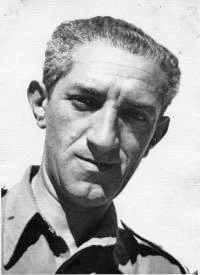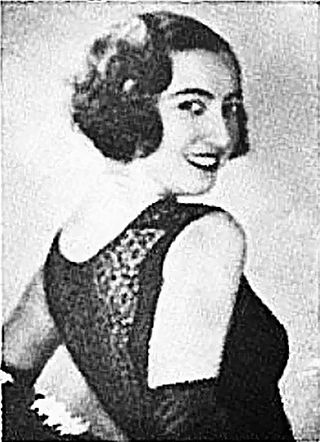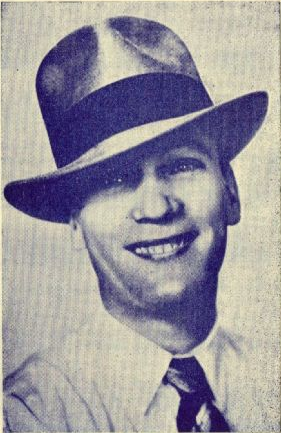Related Research Articles

Eugeniusz Bodo was a film director, producer, singer, pianist and one of the most popular Polish actors and comedians of the interwar period. He starred in some of the most popular Polish film productions of the 1930s, including His Excellency, The Shop Assistant, Czy Lucyna to dziewczyna?, and Pieśniarz Warszawy.

Henry Vars was a Polish-American composer, arranger and conductor whose compositions spanned popular, jazz and classical genres. He is regarded as the most important musical theatre, pop and film music composer of the interwar Poland.

Marian Hemar (1901–1972), born Marian Hescheles, was a Polish poet, journalist, playwright, comedy writer, and songwriter. Hemar himself stated that before the outbreak of World War II he had already written 1,200 songs, including such widely popular hits as Może kiedyś innym razem and Upić się warto . Hemar was a final pen name adopted by Marian in his literary career. It was formed from the first two letters of his last name, Hescheles, and the first three letters of his given name, Marian.

Jerzy Jurandot, born Jerzy Glejgewicht, was a popular Polish poet of Jewish ancestry, dramatist, satirist and songwriter.

Wojciech Młynarski was a Polish poet, singer, songwriter, translator and director. A well-known figure on the Polish musical scene, he was most famous for his ballads and what is known as sung poetry, as well as for his collaboration with numerous vocalists and cabarets. He wrote lyrics to more than 2,000 songs, a small fraction of which he sang himself. His songs received a total of 25 "Karolinkas", which are the main awards of the Polish Song Festival in Opole, the most important Polish song festival, occurring annually since 1963. He also composed music to some of his songs. He is considered an icon of Polish culture.
Marta Mirska,, was a Polish singer active from 1940 to the mid-1960s. Her distinctive alto voice brought her to popular attention immediately before World War II. Her popularity peaked in the 1950s, with recordings on the Poznań-based Mewa and then the Polskie Nagrania labels. Her best-known song was Pierwszy siwy włos, a nostalgic tango written by Kazimierz Winkler and Henryk Hubertus Jabłoński originally for singer Mieczysław Fogg.

Kazimierz Krukowski, professionally known as Lopek, was a Polish cabaret performer and writer, revue and film actor.

Zygmunt Białostocki was a Polish Jewish musician and composer. He composed many popular Polish pre-war songs, and worked as conductor and a première pianist in Warsaw between the World Wars.
Henryk Gold was a Polish-American composer, arranger, and orchestra director.

Fanny Gordon, (Polish:Faina Markowna Kwiatkowska Russian: Фаина Марковна Квятковская - was a Polish-Soviet composer. She was the only female laykhte-muzik composer in Poland.

Andrzej Włast was a Polish Jewish songwriter. He wrote the lyrics for the 1929 hit song "Tango Milonga" / "Oh, Donna Clara". He died in the Warsaw Ghetto during World War II.

Emanuel Schlechter was born and died in Lwów. He was a Polish-Jewish artist, lyricist, screenwriter, librettist, writer, satirist, translator, composer and director.

Stanisława Nowicka was a Polish dancer and singer, known as the "Queen of Tango".

Tadeusz Faliszewski, was a Polish singer, cabaret actor, director of revues and operettas.

Stefania Górska (1907–1986) was a Polish stage and film actress, composer, singer, and dancer, born in Warsaw. She was married to actor Wacław Zadroziński.

Włodzimierz Korcz is a Polish composer, pianist, music producer and author of many popular songs. He graduated from the Academy of Music in Łódź and debuted in 1965. In 1968–1970 Korcz worked as music editor for Polskie Radio in Łódź. In 1974–1977 he was the music director at Teatr na Targówku in Warsaw.

Zula Pogorzelska born Zofia Pogorzelska, was a Polish cabaret and film actress. She was the first Polish performer to introduce the Charleston on stage of the Cabaret Pod sukienką in 1926. Pogorzelska was the wife of popular Warsaw cabaret and film artist Konrad Tom a.k.a. Konrad Runowiecki.

Jakub Kagan was a popular Polish-Jewish composer, pianist, jazz musician and arranger. In the early 1920s, he formed the Kagan's Jazz Band in Warsaw, performing in operettas, cabarets, and hotels. Since 1922 Kagan was a feature artist at the Kabaret Mirage and at the Teatr Nowości. In 1926 he signed a contract with the luxury Hotel Bristol in Warsaw. His band performed world-renowned standards as well as his own compositions widely popular across the country. He died in Warsaw during the Holocaust in occupied Poland.
"Bal u starego Joska" is a waltz ballad by the Polish-Russian composer, Fanny Gordon, and lyricists, Julian Krzewiński and Leopold Brodziński. It is a popular Polish song in the piosenka apaszowska or apache songs genre which arose in the Polish underworld of the 1930s. The song was written around 1934 for one of Warsaw's literary cabaret theatres. The theatres were frequented by the Polish intelligentsia.

Karol Szczęsny Hanusz was a Polish theatrical, cabaret and silent film actor and singer (baritone). He was one of the first Polish cabaret stars.
References
- 1 2 "Details Polskie Tango". Archived from the original on 2010-07-08. Retrieved 2011-03-02. Orient recording company notes by historian pl:Jerzy Płaczkiewicz
- ↑ http://yiddishmusic.jewniverse.info/astonadam/index.html Biographies of noted Jewish musicians
- ↑ Biblioteka Polskiej Piosenki